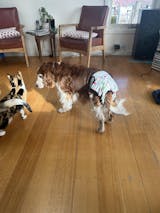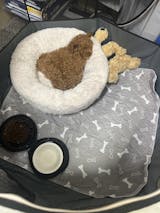How to Calm Down A Hyper Dog - Control Over Excited Puppies
A dog who circles, jumps up and down, or barks and yips is not a happy dog. All of these are symptoms of Excitability in dogs. The dog has an abundance of energy, and the only way her brain knows how to deal with it is to burn it off physically.
Unfortunately, these signs are sometimes misinterpreted as signs of contentment. Many people think it's cute when a dog acts like this, and they inadvertently encourage the behavior. Reduce your dog's excitement, and you'll be averting future misbehaviors, including aggression.
An overly excited dog is not a happy dog. A relaxed dog is one. Here is everything you need to know to calm down an over-excited puppy.
What is Excitability in Dogs?
Depending on your energy state and how you approach your dog's behavior, a hyper dog can be an energetic, lively companion or an inexhaustible source of mischief and trouble. Excitability in dogs can be too much sometimes. So with proper training, patience, and lots of treats, you can teach him to control his energy.

If your dog appears eager or too excited, the problem is likely due to boredom and a lack of stimulation. So, to tackle the problems, you must evaluate how you engage with your dog and the type of activities your dog receives regularly.
Too frequently, the phrase "hyper" is connected with undesirable behavior, yet hyper dogs are not always more of a problem than any other breed. A hyper dog has more energy and maybe more adventurous and observant than other breeds. Which are the most hyper dog breeds, and are you prepared for their energy?
Is a Hyper Dog Right For You?
Having a dog is refreshing and fun. But what if it is a hyper dog? How to calm an over-excited puppy? It will take a lot of energy and time. Check the list and see if you're prepared for this.
- You may simply help a hyper dog breed work off its excess energy if you love lengthy walks, energetic sports, plenty of exercises, and time outside. If quiet time, such as reading a book, doing crafts, or watching television, is your ideal relaxation, you may want to pick a more sedentary breed.
- If hyper dogs are confined for an extended period, they might become worried or anxious, leading to unwanted behaviors such as excessive barking or chewing on objects.

- Before selecting a dog breed, consider all family members. Most energetic dogs do not get along with extremely young children, especially newborns and toddlers, because they may not manage their energy well enough to avoid unintended harm. Similarly, aged family members may be unable to keep up with a hyperactive, lively dog.
- A hyper dog requires space to expend energy, so a larger home with a wide yard is ideal. If you don't have a yard, having quick access to a large park will do the work. However, if you live in a small apartment with no surrounding parks, a less energetic dog breed may be a better fit.
- High-energy dogs require dedicated training not only for basic obedience but also to keep both their minds and bodies engaged throughout their lives. Before choosing a hyper dog breed, be sure you are willing to properly train your dog and reinforce and expand that training beyond basic basics.
Breeds Play a Vital Role in Excitability in Dogs
Before we jump into the point "How to Calm Down a Hyper Dog," numerous dog breeds are well-known for their high energy levels. While individual dogs' levels of hyperactivity will vary depending on their temperaments, some breeds are more likely to be hyper.
- Airedale terrier
- Australian shepherd
- Beagle
- Belgian malinois
- Border collie
- Boxer
- German shepherd
- Golden retriever
- Irish setter
- Jack Russell terrier
- Labrador retriever
- Miniature pinscher
- Pembroke welsh corgi
- Poodle
- Siberian husky
- Staffordshire bull terrier
- Vizsla
- Weimaraner
- Yorkshire terrier
While these dog breeds are well-known for their high energy levels and high-strung dispositions, any dog of any type can be hyper. A dog's personality is unique, and every dog can be hyper based on its training, food, degree of exercise and activity, age, discipline, and other things.
A walk on a leash may not be enough for energetic breeds. Consider fetching and running activities in a fenced-in yard or a dog park where the dog can run freely. If you are away from home for an extended amount of time throughout the day, doggie daycare may be a good alternative for your dog.
Calm an Over-Excited Puppy - Know What Triggers Them
The first step to calm an over-excited puppy is to understand its behavior. So, what are the over-excited behaviors to be on the lookout for?
If your puppy is peaceful one minute and then abruptly exhibits a behavior shift such as zoomies (uncontrollably racing in circles or back and forth), jumping, mouthing and nipping, barking, spinning in circles, and so on. All of these signs suggest that your dog has become overly stimulated.
Over-excitement in your puppy might result from a sudden surprise by new stimuli, being aroused in an activity, or impatiently expecting something. This brings us to the topic of triggers!

If you've verified that your puppy is experiencing over-excitement tendencies, the next step in moderating your dog's excitement is to conduct some research.
Consider all of the times your puppy demonstrated excessively eager behavior. Consider what was happening during those actions: your puppy may be shocked to encounter other dogs, squirrels, or humans on their stroll or in your yard. Your pet has been waiting for your arrival for hours when you step through the door. You may see a pattern of surprise and anticipation as two of the most common components in these occasions, which can contribute to an increase in arousal in your puppy.
Other triggers can occur during an activity, particularly playtime. It's not unusual for a puppy who has already been engaged in something engaging, like a tug game. During these activities, our hands and feet, which act as fascinating moving targets for puppies, might sometimes intrigue and arouse your puppy.
Excitability in Dogs - Why Your Dog Show The Signs
Before you start the training to calm an over-excited puppy, you need to know the reasons behind their behavior.
When dogs are growing, they need to be among other puppies, older dogs, or animals of any kind. People provide affection and support, yet they can easily become sidetracked for long periods. They require the kind of attention and care that other dogs provide naturally.

Socialization, correct training, and positive reinforcement throughout these formative years are critical to a high-energy dog's general well-being in their later years. A well-trained dog attracts more attention from other dogs and people, as well as more love from its owners. As a result, more care must be taken during the puppy years to minimize hyperactive behavior.
What many dog owners mistake for lack of discipline is learned disobedience. How could anyone teach disobedience? There are a thousand and one ways this can happen, but the two most typical concerns with trained disobedience are praising after an ineffective session and the owner's emotions.
They may become hyperactive if they do not engage in enough physical activity in proportion to their energy level.
How to Calm Down a Hyper Dog - Actions to Achieve Success
When you have a hyperactive dog, it might be difficult to unwind at the end of a long day. They only want to play when you want to sit back and relax. What should you do to calm an over-excited puppy?
Even after some physical activity, your dog may still bounce off the walls due to overstimulation.
Perhaps your dog becomes anxious due to separation anxiety or loud noises such as thunderstorms or fireworks, and you find yourself trying to calm and reassure them to no effect. Pacing, barking, or clinginess regularly can be heartbreaking.
Let's go over some simple techniques to soothe and quiet your dog -
Ignore The Behavior - Dogs crave your attention. Focusing on the hyper dog during outbursts reinforces the specific behavior you're attempting to eliminate. Try it the next time your dog jumps or nips at you overly exuberant — no touch, no talk, no eye contact — and see how you fare. You may be astonished at how soon the dog calms down.
Feed Your Dog With Snuffle Mats - Get rid of the food bowl! Making your dog's mealtimes more interesting is a terrific way to tire them out. Dogs are natural foragers, so sniffing out kibble or goodies from a snuffle mat fulfills this need. Snuffle mat by Dry Paws is made of fleece. To make "fingers," fabric strands are woven through a strong backing and tied off on the upper side of the mat. The fingers make it a fun eating toy that engages and soothes your dog during mealtime.
Engage Their Nose - You may exercise your dog's nose by hiding treats about the house for them to find. This game activates their brain's seeking system, bringing in those feel-good endorphins! Begin slowly when training your dog how to play "Find It!" Put your dog in a sit or down stay, then hide the treat somewhere they can see where you put it. "Find it!" releases them from their confinement. Don't be afraid to assist them if they require motivation to find the treat. Give them lots of praise when they uncover the hidden reward. As they get the hang of it, make the hiding sites more difficult to detect and hide more rewards for them to find.

The scent of lavender is supposed to relax humans; a soothing scent can be very comforting to your pet. Consult your veterinarian or a holistic professional to determine which scents may work for your dog and which distribution methods are the safest for him.
Provide a Way Out - With Restrictions. Keeping your dog's mind occupied can also aid in the reduction of surplus energy. This is where playtime comes into play. Playing fetch, having your dog look for a hidden treat, or putting him through an obstacle course are excellent methods to exercise his brain while draining his energy. The main point here is that you have complete control over the duration and intensity of the activity. This is where "limitations" come into play. If your dog becomes overly eager, the game is over. This is a kind of gentle negative reinforcement. While praising calm behavior, inform your dog, "When I settle down, I get a treat," imposing limitations tell your dog, "If I get too crazy, the treat disappears."
Create a job for the dog. Increased physical activity is beneficial. On the other hand, active, intelligent breeds can benefit from something to do daily that incorporates both physical and mental activity. Fieldwork, herding, lure coursing, and dock diving are excellent performance activities for canine athletes. Activities like obedience, agility, and rally provide the right balance of physical and cerebral stimulation for the energetic dog.
Instill good manners. A dog who leaps all over you when you try to clip his leash on during a walk, continually nose bops you for attention, and barks at you when he wants his supper may appear hyperactive, but these improper behaviors indicate a lack of manners rather than a hyperactivity problem. Manners training will teach your dog how to interact with you so that he receives what he wants—food, attention, play, or access to the outdoors—in a way that combines impulse control, which is frequently the missing link in seemingly energetic dogs.

The primary idea behind manners training is to educate your dog to say "please" by sitting for whatever he desires. Ask your dog to sit before you throw the ball, open the door, attach the leash, or place the food bowl. When your dog accomplishes it, reward him with anything he wants, no more treats are required. Your dog will quickly realize that "sit" causes good things to happen. With consistency on your part (that is, always remember to request the sit before doing something for your dog), he will begin to volunteer the position rather than acting pushy with you.
You can even do crate training with a crate or playpen. Dry paws’ playpen is big enough so that your dog can walk freely. Put some toys and foods in there.
Think about the food. Fillers, byproducts, coloring, and sugar are common elements in low-cost diets that your dog does not require. Just as eating junk food can affect human moods, giving your dog a poor quality diet might affect his behavior.
Because studies have found a link between hyperactivity and specific dog food ingredients, it makes sense to feed your dog a high-quality diet with pure, easily recognizable ingredients, such as identifiable meats (no animal byproducts) and minimal fillers and preservatives.
Don't forget about the veterinarian examination. A veterinary check-up is in order if you've implemented a suitable exercise regimen for your dog's age and breed and the dog still appears to be overactive. While exercise, training, and activities are usually the culprits, several medical disorders might promote hyperactivity. Your dog's veterinarian can perform a thorough medical examination to rule out any concerns.
A Chill-Out Routine to Calm an Over Excited Puppy
How to calm down a hyper dog? Maintaining a simple routine can do the trick. Here is a basic routine as an example. You can modify it according to your time, area, energy, equipment, etc.
Step One: Exercise

Choose an active activity such as a lengthy walk, a hike, fetch, etc. The more time you have available, the more intense your exercise should be. But talk to the vet before doing an intense workout with your puppy. Their developing bodies may be unprepared for this.
Step Two: Interactive Brainwork

We're lowering the energy level a notch here. Changing from the heedless enjoyment of the prior pastime to one that takes concentration. Train your dog in tricks or obedience, or play a training game like hide-and-seek. If you're in a training class, now is the time to do your homework. If you're short on time, prioritize brain work over exercise. The most productive activities incorporate both physical activity and mental stimulation.
Step Three: Breakfast in Puzzle Toys

Breakfast can be placed in puzzle toys such as a snuffle mat. A dog who has spent her entire life eating from a bowl is unlikely to be patient with this at first. Begin slowly. You don't have to do it first thing in the morning. It's best to do it first thing in the morning so your dog will be more relaxed during the day when you're gone. However, if you don't have time in the morning, you can do it whenever you like.
Dos and Don’ts to Reduce Excitability in Dogs
We've developed a list of dos and don'ts for you to understand how to calm down a hyper dog!
Don't feed their enthusiasm. This is something that many owners do unwittingly in some form. Giving your puppy attention with similar vigor will only excite your puppy even more. Your dog is a reflection of yourself. He will return any energy you put out there. Instead, maintain as much neutral energy as possible and avoid feeding into the enthusiasm.
Don't buy into the idea that "they'll grow out of it." There is a common notion that puppy energy fades with age. While some puppies do settle down as they grow older, over-excitement isn't typical puppy energy and can persist even in adult dogs. The goal is to recognize when and what causes over-excitement so that it may be addressed before it gets out of hand.
Give your puppy a place to run. One of the greatest strategies to handle over-excitement is directing your puppy's energy toward something beneficial, such as an exercise or toy.

Recognize and reward calm behavior. Allow your pup plenty of time to thoroughly relax and settle before rewarding them with attention, calming rubs, or a special chew toy that encourages them to stay calm. Rewarding them at the appropriate moment and in the appropriate manner can help them understand what acceptable behavior is faster!
Maintain your cool at all times! Staying calm is the best approach to cope with an overly excited puppy. This implies that no matter how frustrated you are, you should always maintain a slow and even tone of voice to help your puppy calm down.
Final Thoughts
It's always enjoyable to have a cheerful dog as a buddy! However, excitability in dogs is not always pleasing. As a result, we need to calm our overexcited puppy. We will need a proper plan and routine to do this.
Please follow the steps outlined above. Also, before beginning any workout or nutrition regimen, contact a veterinarian. Because each dog is unique, so is its body. What worked for one dog may or may not work for another. Your veterinarian will know what is best for your dog.
Another item to consider is patience. You can't scold him and expect him to quit acting hyperactive. With your dog, your patience can do anything.

















